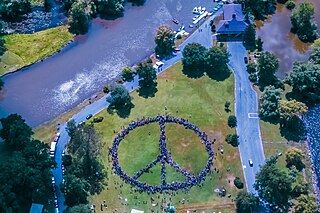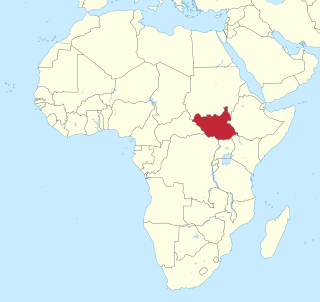A peace process is the set of sociopolitical negotiations, agreements and actions that aim to solve a specific armed conflict.

The United Nations (UN) is an intergovernmental organization whose purposes are to maintain international peace and security, develop friendly relations among nations, achieve international cooperation, and be a centre for harmonizing the actions of nations. It is the world's largest and most familiar international organization. The UN is headquartered on international territory in New York City, and has other main offices in Geneva, Nairobi, Vienna, and The Hague.

The United Nations Security Council (UNSC) is one of the six principal organs of the United Nations (UN) and is charged with ensuring international peace and security, recommending the admission of new UN members to the General Assembly, and approving any changes to the UN Charter. Its powers include establishing peacekeeping operations, enacting international sanctions, and authorizing military action. The UNSC is the only UN body with the authority to issue binding resolutions on member states.

The United Nations General Assembly is one of the six principal organs of the United Nations (UN), serving as the main deliberative, policymaking, and representative organ of the UN. Currently, in its 76th session, its powers, composition, functions, and procedures are set out in Chapter IV of the United Nations Charter. The UNGA is responsible for the UN budget, appointing the non-permanent members to the Security Council, appointing the UN secretary-general, receiving reports from other parts of the UN system, and making recommendations through resolutions. It also establishes numerous subsidiary organs to advance or assist in its broad mandate. The UNGA is the only UN organ wherein all member states have equal representation.

Peacebuilding is an activity that aims to resolve injustice in nonviolent ways and to transform the cultural and structural conditions that generate deadly or destructive conflict. It revolves around developing constructive personal, group, and political relationships across ethnic, religious, class, national, and racial boundaries. The process includes violence prevention; conflict management, resolution, or transformation; and post-conflict reconciliation or trauma healing before, during, and after any given case of violence.

The United Nations Peacebuilding Commission (PBC) is a United Nations intergovernmental advisory body of both the General Assembly and the Security Council that supports peace efforts in conflict affected countries. A key addition to the capacity of the international community in the broad peace agenda, it was established in 2005 with the passage of both A/RES/60/180 and S/RES/1645 Rabab Fatima is the incumbent chair of PBC.

United Nations Security Council Resolution 1674, adopted unanimously on April 28, 2006, after reaffirming resolutions 1265 (1999) and 1296 (2000) concerning the protection of civilians in armed conflict and Resolution 1631 (2005) on co-operation between the United Nations and regional organisations, the Council stressed a comprehensive approach to the prevention of armed conflict and its recurrence.

The United Nations Department of Political and Peacebuilding Affairs (DPPA) is a department of the Secretariat of the United Nations (UN) with responsibility for monitoring and assessing global political developments and advising and assisting the UN Secretary General and his envoys in the peaceful prevention and resolution of conflict around the world. The department manages field-based political missions in Africa, Central Asia, and the Middle East, and has been increasing its professional capacities in conflict mediation and preventive diplomacy. DPPA also oversees UN electoral assistance to Member States of the organization. Established in 1992, the department's responsibilities also include providing secretariat support to the UN Security Council and two standing committees created by the General Assembly concerning the Rights of the Palestinian People and Decolonization. DPPA is based at the UN Headquarters in New York City.
Peacekeeping by the United Nations is a role held by the Department of Peace Operations as an "instrument developed by the organization as a way to help countries torn by conflict to create the conditions for lasting peace". It is distinguished from peacebuilding, peacemaking, and peace enforcement although the United Nations does acknowledge that all activities are "mutually reinforcing" and that overlap between them is frequent in practice.

United Nations Security Council Resolution 1938, adopted unanimously on September 15, 2010, after recalling previous resolutions on the situation in Liberia, including resolutions 1509 (2003), 1626 (2005), 1836 (2005) and 1885 (2009), the Council extended the mandate of the United Nations Mission in Liberia (UNMIL) for a further twelve months until September 30, 2011 and required it to provide electoral assistance.

United Nations Security Council Resolution 1947, adopted unanimously on October 29, 2010, after recalling Resolution 1645 (2005), the Council reaffirmed the role of the United Nations Peacebuilding Commission within the organisation.

United Nations Security Council resolution 1565, adopted unanimously on 1 October 2004 after recalling all previous resolutions on the situation in the Democratic Republic of the Congo, extended the mandate of the United Nations Mission in the Democratic Republic of Congo (MONUC) until 31 March 2005 and authorised an additional deployment of 5,900 troops and police. It reaffirmed the commitment to respect the “sovereignty, territorial integrity and political independence [sic]” of Congo and States in the region.

United Nations Security Council resolution 1625, adopted unanimously at the 2005 World Summit on 14 September 2005, the Council adopted a declaration on the role of the Security Council in conflict prevention, particularly in Africa where many armed conflicts were taking place.

United Nations Security Council resolution 1631, adopted unanimously on 17 October 2005, after recalling Chapter VIII of the United Nations Charter, the council addressed co-operation between the United Nations and regional organisations in the maintenance of international peace and security.

United Nations Security Council Resolution 1646, adopted on 20 December 2005, after recalling Resolution 1645 (2005) adopted immediately prior to this resolution, the council addressed the membership of the United Nations Peacebuilding Commission.

United Nations Security Council Resolution 1996, adopted unanimously on July 8, 2011, after welcoming the independence of South Sudan from Sudan, the Council established the United Nations Mission in the Republic of South Sudan (UNMISS) for an initial period of one year.

United Nations Security Council Resolution 1710, adopted unanimously on September 29, 2006, after reaffirming all resolutions on the situation between Eritrea and Ethiopia, particularly resolutions 1320 (2000), 1430 (2003), 1466 (2003), 1640 (2005) and 1681 (2006), the Council extended the mandate of the United Nations Mission in Ethiopia and Eritrea (UNMEE) for four months until January 31, 2007.

United Nations Security Council Resolution 1734, adopted unanimously on December 22, 2006, after recalling all previous resolutions on the situation in Sierra Leone, including resolutions 1620 (2005) and 1688 (2006), the Council renewed the mandate of the United Nations Integrated Office in Sierra Leone (UNIOSIL) until December 31, 2007.
Sylvester E. Rowe is a former Ambassador and Deputy Permanent Representative of Sierra Leone to the United Nations. He joined the Mission in 1997 as an adviser after a distinguished career in the United Nations Secretariat spanning three decades during which he served in several capacities including head of the UN Radio and Television Services; a speech writer and Spokesman for the President of the 39th session of the UN General Assembly (1984–85), and a member of the panel of counsel in the UN administration of justice system – the Joint Appeals Board and the Administrative Tribunal. In 1994 he served as a resource person in Ambassador Brahimi's special mission on behalf of the Secretary-General of the United Nations, to Liberia and the ECOWAS Chair in Ghana, aimed at facilitating implementation of the Cotonou Peace Agreement for Liberia.

United Nations Security Council Resolution 2167, concerning the critical role of regional cooperation in International Peacekeeping and Security was adopted unanimously on 28 July 2014. The resolution originated through a debate initiated by the Permanent Representative of Rwanda by sending a letter dated 3 July addressed to the Secretary-General. The 15 member body emphasised that concrete steps should be taken by United Nations and regional organisations to strengthen their relationships and develop more effective partnership. The resolution reaffirms support for African Union and European Union collaboration with peacekeeping operations.















